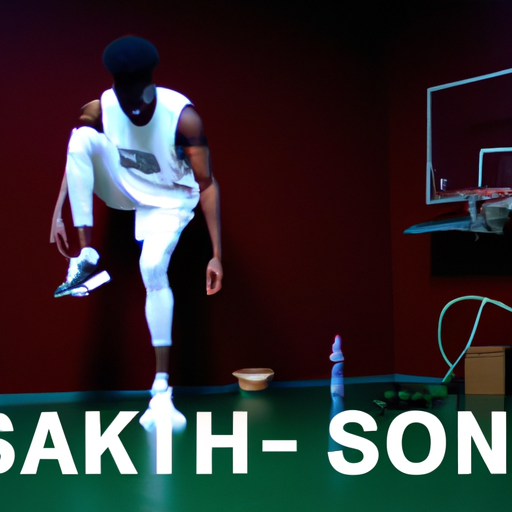Jonathan Isaac launches anti-woke, pro-Christian alternative to Nike

The Rise of Jonathan Isaac’s Anti-Woke Movement
Jonathan Isaac, the rising star of the NBA, has recently made headlines for more than just his impressive skills on the court. In a bold move, Isaac has launched an anti-woke, pro-Christian alternative to the popular sportswear brand Nike. This move has sparked a new movement that is gaining traction among those who feel disillusioned by the current cultural climate.
Isaac’s decision to create his own brand comes at a time when many athletes are using their platforms to promote social justice causes and advocate for change. While these efforts are commendable, Isaac believes that the focus on woke culture has overshadowed the importance of faith and traditional values. He aims to provide an alternative for those who share his beliefs and want to support a brand that aligns with their values.
The rise of Isaac’s anti-woke movement can be seen as a response to the increasing polarization in society. As conversations around social justice and equality become more prevalent, there is a growing divide between those who embrace woke culture and those who feel it has gone too far. Isaac’s brand seeks to bridge this gap by offering a space for individuals who feel marginalized by the dominant narrative.
One of the key aspects of Isaac’s movement is its emphasis on Christianity. As a devout Christian himself, he believes that faith should play a central role in people’s lives. His brand incorporates Christian symbols and messages, providing a platform for believers to express their faith through their clothing choices. This is particularly significant in a society that often marginalizes or dismisses religious beliefs.
Isaac’s anti-woke movement also challenges the prevailing narrative that athletes should solely focus on their sport and stay out of politics. He believes that athletes have a responsibility to use their platforms to promote positive change, but that change should not be limited to one particular ideology. By creating his own brand, Isaac is taking a stand against the notion that athletes must conform to a specific set of beliefs in order to be socially conscious.
The response to Isaac’s movement has been mixed. While many have praised his courage and commitment to his beliefs, others have criticized him for what they perceive as a rejection of progress and social justice. Some argue that his brand perpetuates a divisive narrative and undermines the efforts of those fighting for equality. However, Isaac remains steadfast in his conviction that his movement is necessary and important.
As the anti-woke movement gains momentum, it raises important questions about the role of activism and the limits of social justice. Can individuals advocate for change without subscribing to a specific ideology? Is it possible to find common ground in a society that is increasingly polarized? These are complex questions that require thoughtful consideration and open dialogue.
Jonathan Isaac’s anti-woke movement is a testament to the power of individual conviction and the desire for alternative voices to be heard. While it may not be without controversy, it serves as a reminder that diversity of thought and belief is essential for a healthy and inclusive society. As the movement continues to grow, it will be interesting to see how it shapes the conversation around social justice and the role of athletes in promoting change.
Exploring the Controversy: Jonathan Isaac’s Pro-Christian Stance

Jonathan Isaac, the professional basketball player for the Orlando Magic, has recently made headlines with the launch of his own brand of athletic apparel. This brand, called “Stand for Christ,” aims to provide an alternative to popular sportswear brands like Nike, which Isaac believes have become too politically and socially “woke.” Isaac’s decision to create this brand has sparked controversy and ignited discussions about the intersection of sports, religion, and activism.
Isaac’s pro-Christian stance is at the core of his brand’s mission. He has been vocal about his faith and his belief that athletes should use their platform to spread the message of Christ. In a society where athletes often use their influence to advocate for social justice causes, Isaac’s decision to focus on his religious beliefs has drawn both praise and criticism.
One of the main criticisms of Isaac’s brand is that it promotes a narrow-minded and exclusionary view of Christianity. Some argue that by aligning himself with a specific religious ideology, Isaac is alienating fans and perpetuating a divisive narrative. However, Isaac has defended his brand, stating that he is not trying to exclude anyone but rather provide an alternative for those who share his beliefs.
Isaac’s brand also stands in contrast to the trend of athletes using their platform to advocate for social justice causes. In recent years, we have seen athletes like Colin Kaepernick and LeBron James use their fame to raise awareness about issues such as racial inequality and police brutality. Isaac’s decision to focus on his faith instead of these pressing social issues has been met with mixed reactions.
Supporters of Isaac argue that he should be commended for staying true to his beliefs and not succumbing to the pressure to conform to popular narratives. They believe that athletes should have the freedom to express their views, even if they differ from the mainstream. Isaac’s brand provides an alternative for those who feel that their values are not represented by other sportswear brands.
On the other hand, critics argue that Isaac’s brand is a missed opportunity to use his platform for positive change. They believe that athletes have a responsibility to use their influence to address social issues and promote inclusivity. By focusing solely on his faith, Isaac is neglecting the potential impact he could have on important conversations happening in society.
The controversy surrounding Isaac’s brand also raises questions about the role of religion in sports. While many athletes are religious and use their faith as a source of motivation and inspiration, few have taken such a public stance on their beliefs. Isaac’s brand brings the intersection of sports and religion to the forefront, forcing us to examine the boundaries of personal expression and the responsibilities that come with being a public figure.
In conclusion, Jonathan Isaac’s launch of the “Stand for Christ” brand has sparked controversy and ignited discussions about the role of religion in sports. While some applaud his decision to stay true to his beliefs, others criticize him for not using his platform to address pressing social issues. The controversy surrounding Isaac’s brand highlights the complexities of navigating personal expression and responsibility as a public figure in the world of sports.
A Closer Look at Jonathan Isaac’s Alternative to Nike: What Does It Mean for the Sports Industry?
Jonathan Isaac, the professional basketball player for the Orlando Magic, has recently made headlines with the launch of his own brand of athletic apparel. This brand, called “The 34th Brand,” aims to provide an alternative to popular sportswear giant Nike, with a focus on promoting Christian values and rejecting what Isaac refers to as the “woke” culture.
Isaac’s decision to create his own brand comes at a time when athletes are increasingly using their platforms to express their views on social and political issues. Many have embraced the concept of being “woke,” which generally refers to being aware of and actively fighting against social injustices. However, Isaac has taken a different stance, choosing to distance himself from this movement and instead align himself with his Christian beliefs.
The 34th Brand is not just a clothing line; it is a statement. Isaac wants to use his brand to promote his faith and values, which he believes have been overshadowed by the prevailing culture in the sports industry. By creating an alternative to Nike, he hopes to provide athletes and consumers with a choice that aligns more closely with their own beliefs.
This move by Isaac raises important questions about the influence of athletes in the sports industry. Traditionally, athletes have been seen as role models and influencers, with their endorsements carrying significant weight. Nike, in particular, has been successful in leveraging the star power of athletes to promote its brand and values. However, Isaac’s decision to go against the grain and create his own brand challenges this dynamic.
The launch of The 34th Brand also highlights the growing demand for alternatives in the sports industry. As more athletes become vocal about their beliefs and values, there is a segment of consumers who may feel disconnected from the mainstream brands that dominate the market. Isaac’s brand offers an alternative for those who want to support a brand that aligns more closely with their own worldview.
However, it remains to be seen whether The 34th Brand can truly compete with the likes of Nike. Nike has established itself as a global powerhouse, with a strong brand identity and a loyal customer base. Isaac’s brand, on the other hand, is still in its infancy and will need time to build its reputation and gain traction in the market.
Another challenge that Isaac may face is the potential backlash from those who disagree with his views. In today’s polarized society, any public figure who takes a stand on controversial issues is likely to face criticism and pushback. Isaac’s decision to create a pro-Christian brand may alienate some consumers who do not share his beliefs, potentially limiting the brand’s appeal.
In conclusion, Jonathan Isaac’s launch of The 34th Brand represents a significant development in the sports industry. By creating an alternative to Nike that promotes Christian values and rejects the “woke” culture, Isaac is challenging the status quo and offering consumers a choice that aligns more closely with their own beliefs. However, the success of The 34th Brand will depend on its ability to compete with established brands like Nike and navigate the potential backlash from those who disagree with its message. Only time will tell whether Isaac’s brand can truly make an impact in the sports industry.

